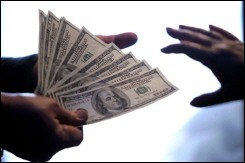
The euro which is rising, which is rising… what are the consequences?
In two weeks, the European currency has seen its value increase by 4 pc against the dollar. Main cause of the increase: the contrasting evolution of interest rates in the United States and Europe. No worries for the moment, says an analyst. Without lifting a finger, the holder of monetary funds denominated in euros has just seen his assets swell by 4 pc in two weeks. That’s an impressive increase of… 96 pc year-on-year! Provided you refer to the dollar. Because although it has also appreciated against other currencies such as the yen, it is against the greenback that the European currency has recorded this dazzling progression.
Why did the euro jump so strongly against the dollar? The most obvious answer lies in the interest rate differential between the United States and the euro zone. While the American Federal Reserve (Fed) has paused in its cycle of raising rates and could even lower them around March or April 2007, the European Central Bank (ECB) continues, for its part, to tighten the monetary screw. Economists expect an increase in the ECB’s main key rate this Thursday, to 3.5 pc. And it might not be the last. “During its previous meeting, the ECB left the door open to further rate increases ,” explains Annick Pierard, analyst at ING. “According to our estimates, it will raise its rates by a further quarter of a point, at the earliest in February. As it stands, we estimate that 3.75 pc will be the maximum rate for 2007.” Given that, unlike the ECB, the Fed is expected to lower its rates in 2007, currency traders tend to review their positions in dollars. And to favor the euro.(…) Currency traders are also keeping an eye on Asia. Because this is where two thirds of the planet’s foreign exchange reserves are concentrated. “When the Central Bank of China says that it could diversify its reserves, there is inevitably an effect on the foreign exchange market ,” underlines Annick Pierard. “Operators’ concerns are growing and they tend to want to hedge against a possible drop in the dollar rate . ”
If the euro rises, companies that export outside the euro zone are penalized, their goods and services becoming more expensive to sell. In this regard, is the current level of the European currency (over $1.33) critical? “No,” says Annick Pierard. “Far from only following the rate of the euro against the dollar, the ECB calculates an effective exchange rate making it possible to measure the competitiveness of European companies. The level of this rate is not yet worrying.” would therefore have nothing to worry about European competitiveness in the current state of things. (Source: La Libre Belgique 05/12/2006).
This type of false good news is cause for concern, both in terms of the quality of journalistic information and that of economic analysis.
The eurozone economy is exhausted. You just have to look around to see the general apathy, the development of poverty, precariousness, the weakness of growth, the permanence of unemployment, the difficulty of living. The ECB follows a purely monetarist logic inherited from its history, and which was that of the Bundesbank before it; but the Bundesbank itself operated in a German context of social market economy which is not the European context. In this regard, the rise of the euro is not good news. Whether stock or commercial speculators take advantage of it occasionally or systematically is possible; This is their business and not that of the majority. The euro is not “strong” because it is supported by a strong economy. It rises because a bloodless economy generates less apparent inflation, matters less; because cuts in employment and wages favor financial profits in the short term.
It should also be noted that if the euro is progressing, it is mainly and from the start, in relation to the American dollar. For what? Everything suggests that the American government has chosen to let the dollar slide to finance its gigantic deficits from abroad, and particularly from the European Union, in order to continue its policy of expansion and support for the economy, including the military economy.
Have our “intelligent” European leaders been trapped by their imperial ambition? They undoubtedly think of placing the consequences of their policy on the majority of Europeans…












